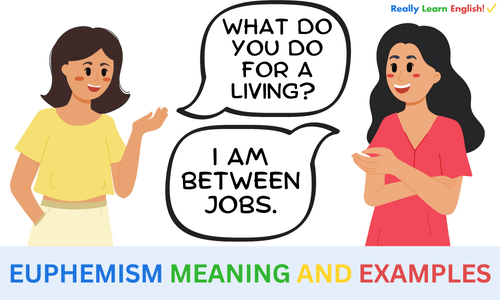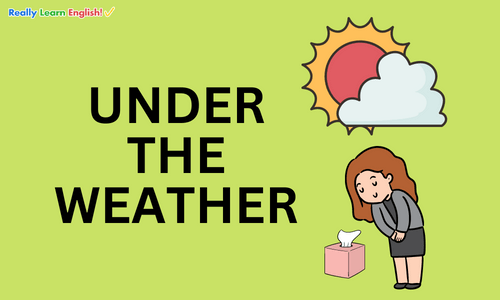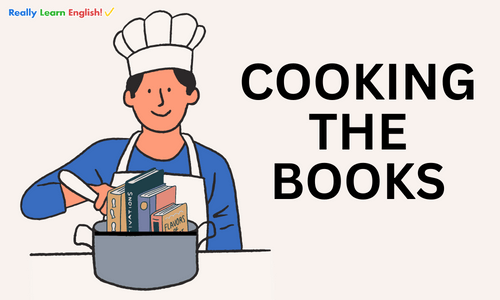How Euphemism Is Used: Euphemism Meaning and Examples
Euphemism is when we use kinder or more polite words to talk about something that might be not pleasant or hard to hear.
The goal of euphemism is to make a topic more acceptable or less offensive to the listener or reader. (Offensive means something that makes someone else feel bad).

Lesson Table of Contents
2) The Origin of the Word "Euphemism"
3) Common Examples of Euphemisms
4) Implications of Euphemism Use
5) A Dialogue to Illustrate Euphemism Use
6) Conclusion
Click Here for Step-by-Step Rules, Stories and Exercises to Practice All English Tenses
Definition of "Euphemism"
Euphemisms are words and expressions that help us soften the impact of a topic and make it easier to talk about. They give us a way to talk about difficult topics without having to be too direct.
For example, instead of saying "She died", we might say "She passed away".
We could also say "He doesnt look so good" instead of saying "He looks really sick".
The Origin of the Word
"Euphemism"
The word "euphemism" comes from the Greek word "euphēmos", which means "use of good words."
Common Examples of
Euphemisms
1) "Passed away" (instead of "died")
"Passed away" is a euphemism that is often used to refer to someone who has died. It is a gentler and more polite way of saying that someone has died. Instead of saying "died," which can sound harsh, "passed away" implies that the person has moved on to another place or state of being. It's used to show respect and sensitivity when talking about death.
Example sentences:
- "I'm sorry to hear that your grandmother passed away."
- "The news of his passing away came as a shock to us all."
- "She passed away peacefully in her sleep."
2) "Resting in peace" (instead of "dead")
"Resting in peace" is a euphemism for being dead. It implies that the person has found peace and happiness now that they are no longer alive. It is often used in a religious context, as it suggests the person has gone to a peaceful afterlife.
Example sentences:
- "He is now resting in peace."
- "Rest in peace, dear friend."
- "Our condolences to the family, may the deceased rest in peace."
3) "Let go" (instead of "fired")
"Let go" is a euphemism that is often used to refer to someone who has been fired from their job. It is a gentler and more polite way of saying that someone has been terminated from their position.
It implies that the person was released, rather than being sacked or dismissed. It is often used as a way to soften the blow of the news to the person who was let go, as well as to others who may be hearing the news.
Example sentences:
- "I'm sorry, but we have to let you go."
- "She was let go from the company due to budget cuts."
- "He was let go, but we wish him the best in his future endeavors."
4) "Between jobs" (instead of "unemployed")
"Between jobs" is a euphemism that is often used to refer to someone who is unemployed. It is a gentler and more polite way of saying that someone is not currently working.
It is often used as a way to avoid the negative connotation that the word "unemployed" may have, and to present the person in a more positive light.
Example sentences:
- "She's currently between jobs but actively looking for a new opportunity."
- "He's between jobs, but he's optimistic about finding something soon."
- "He's between jobs, but he's been using this time to volunteer in his community."
5) "Creative with the truth" (instead of "liar")
"Creative with the truth" is a euphemism that is used to describe someone who is not telling the truth or is being dishonest. It is a softer or less harsh way of describing this behavior compared to directly calling someone a "liar".
Example sentences:
- "I think she is being a bit too creative with the truth, she should be more honest."
- "I'm sorry, but their presentation was a bit too creative with the truth, it would be better if they stick to the facts."
- "I don't trust him, he's always been a bit too creative with the truth."
6) "Under the weather" (instead of "sick")
"Under the weather" is a way of saying that someone is not feeling well, without saying that they are sick. It is a polite and less direct way of describing the situation. This phrase is often used as a way of saying that someone is feeling unwell without going into specifics about their illness. It can be used to describe a wide range of physical conditions.
Example sentences:
- "I'm sorry I can't come to the meeting today, I'm feeling a bit under the weather."
- "I think I'm coming down with something, I've been feeling under the weather for a couple of days now."
- "He's been under the weather for a few days, I'm sure he'll be back to his old self soon."

7) "Need some space" (instead of "breaking up")
"Need some space" is a euphemism that is used to describe the ending of a romantic relationship. It is a softer or less direct way of describing this situation compared to saying "breaking up."
This phrase is used to express the desire for time apart without necessarily ending the relationship permanently. It implies that the person wants to take a step back and reassess the situation, rather than ending the relationship immediately.
"Need some space" is a euphemism that is used to describe the ending of a romantic relationship. It is a softer or less direct way of describing this situation compared to saying "breaking up." This phrase is used to express the desire for time apart without necessarily ending the relationship permanently. It implies that the person wants to take a step back and reassess their feelings, rather than ending the relationship immediately.
Example sentences:
- "I think we need to take a break. I need some space to figure out my feelings."
- "I know things have been tough between us lately. I think it would be best if we took some time apart and gave each other some space."
- "She said she needs some space to sort out her feelings, so we're taking a break right now."
8) "Cooked the books" (instead of "fraudulent accounting")
"Cooked the books" is used to describe fraudulent (dishonest and against the law) accounting practices.
This phrase implies that the financial records have been manipulated in order to deceive others, usually to hide or inflate profits, or to avoid taxes or other financial obligations. It is a less direct or less harsh way of describing financial fraud compared to saying "fraudulent accounting" or "financial fraud".
Example sentences:
- "The company was caught cooking the books in order to inflate their profits."
- "An internal audit revealed that the financial manager had been cooking the books for years."
- "The CEO was accused of cooking the books to hide the company's financial troubles."

9) "Running a little behind" (instead of "late")
"Running a little behind" is a euphemism that is used to describe someone who is late (coming or happening after the expected or usual time).
It is a softer or more polite way of describing this situation.
The phrase implies that the person is slightly delayed or behind schedule, rather than totally or significantly late.
It's often used to convey the idea that the person is still on the way or will arrive shortly and the delay is not significant.
Example sentences:
- "I'm sorry I'm running a little behind, I got caught in traffic"
- "I'll be there soon, I'm running a little behind schedule"
- "I apologize for the delay, I'm running a little behind but I'll be there as soon as possible"
10) "Golden years" (instead of "old age")
"Golden years" is a euphemism that is used to describe old age. It is a softer or more positive way of describing this stage of life compared to saying "old age."
The phrase implies that this stage of life can be a time of happiness, satisfaction, and fulfillment, rather than a time of decline.
Example sentences:
- "He is looking forward to my golden years, traveling and enjoying my retirement."
- "The golden years can be a time of great joy and fulfillment if you stay active and engaged."
- "I want to make the most of my golden years, doing things that I love and spending time with my loved ones."
Implications of Euphemism
Use
The use of euphemisms can have both positive and negative implications.
Positive implications:
- Euphemism can be used to make difficult or uncomfortable topics more acceptable for the listener or reader. It can help to soften the blow of bad news, or make a sensitive topic easier to discuss.
- Euphemism can also be used to show respect and sensitivity when talking about sensitive topics such as death, illness, or personal issues.
- It can also help to avoid causing offense or embarrassment, by using more polite or neutral language.
Negative implications:
The use of euphemism can be seen as a form of dishonesty or deception, as it can be used to sugarcoat or hide the truth. Euphemism can also be used to avoid taking responsibility for difficult or uncomfortable situations.
For example, a politician might use the euphemism "collateral damage" instead of "civilian casualties" to describe the deaths of innocent civilians during a military operation. This euphemism might be used to downplay the severity of the situation.
It can also create confusion if the listener does not understand the meaning behind the euphemism.
A Dialogue to
Illustrate Euphemism Use
Here is a short dialogue to illustrate the use of euphemisms (and how they can sometimes be misunderstood):
Manager: "I'm sorry, but we'll have to let you go."
Joe: "Let me go? Like, set me free? That sounds great!"
Manager: "No, not like that. We'll have to terminate your employment."
Joe: "Terminate? Like, end it? That sounds terrible!"
Manager: "Yes, I mean we'll have to fire you."
Joe: "Fire me? Like, with a gun? That sounds dangerous!"
Manager: "No, no, not like that. We'll have to dismiss you from your position."
Joe: "Dismiss? Like, send me away? That sounds cruel!"
Manager: "I'm sorry, I didn't mean to confuse you. We'll have to let you go from your job."
Joe: "Oh, I understand now. I guess this is goodbye."
Manager: "I guess so, Joe."
Conclusion
Euphemism is a tool that can be used to soften the harshness of
difficult topics, as well as show respect and sensitivity.
However, it can also create confusion if the listener does not
understand the euphemism. In such a case, it is important to
explain the true meaning in order to avoid misunderstandings.
Get Updates, Special Offers, and English Resources
Download your FREE GIFT (the first two chapters of
English Short Stories Book and Workbook)
as soon as you join!

By submitting your email, you consent to receiving updates and newsletters from us and to the sharing of your personal data with third parties for the purposes of sending you communications. We will not spam you. You can unsubscribe at any time. For more information, please see our privacy policy.
Return
from
How Euphemism Is Used: Euphemism Meaning and Examples to
Figurative Language





